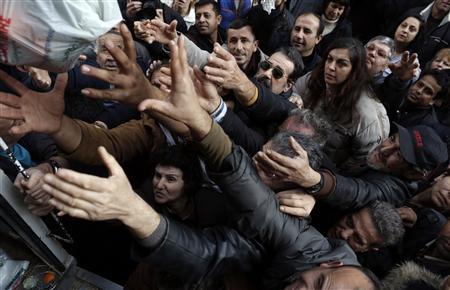– Greek Consumers Most Pessimistic On Earth: 40% Have No Disposable Income (ZeroHedge, Feb 13, 2013):
Chronicling the collapsing Greek socioeconomic reality would be an interesting business school case study of what a zombie monetary regime kept alive at all costs does to the “weakest link(s)” (most recently “Greek Economy Grinds To A Halt As New Construction Implodes By 66.6%” and “Person Trampled As Fight Breaks Out At Greek Free Food Handout“), if only there weren’t real men and women suffering as a result of the stupidity and greed of a few entrenched individuals who will stop at nothing to see their paper wealth preserved at all costs. The latest salvo of the utter misery Greek society finds itself in comes from Nielsen research, which reports that Greeks are now the most pessimistic consumers on the planet, with the Greek consumer confidence index dropping to 35 points in the last quarter of 2012. That is the lowest level among a total of 58 countries surveyed and 11 points lower than the same period last year in Greece.
It gets worse.
As Kathimerini reports: “Four out of 10 Greeks told the same survey that they no longer have any disposable money left after covering their basic needs, which is the highest rate ever recorded in Greece and the biggest in the October-December period in Europe. A year earlier (in Q4 2011) that rate had stood at 34 percent and in Q4 of 2010 it had been at 25 percent.” Obligatory spin: once nobody has any disposable income, things can only get better. Unless, as Rajoy might add, they get worse.
What little money Greek do have is spent “toward the payment of loan and credit card installments (31 percent) or savings (22 percent). Only a very small number of consumers use their disposable income for entertainment, vacations and buying clothes, which helps to explain the turnover slump in of the sectors of food catering, domestic tourism and apparel stores.”
With unemployment soaring to unprecedented levels, it comes as no surprise that finding and/or keeping a job constitutes the greatest concern among Greeks, which, at a rate of 44 percent, is among the highest in the world. The state of the economy ranks second, at 38 percent, debts are third at 26 percent and the increasing level of utility bills are fourth, on 21 percent.
Shrinking disposable incomes combined with insecurity have led to a change in Greeks’ shopping habits, with 77 percent stating they have curtailed spending on entertainment outside the home, 67 percent saying they choose cheaper commodities (mostly own-label supermarket products) and more than half (54 percent) say they have cut down on fuel and electricity.
No wonder nobody tries to sell Europe on forecasts of a second half improvement in 2010, 2011, 2012, 2013 anymore. By now virtually all of them have given up.
The same survey found that the country with the most optimistic citizens is India, with an index reading of 121 points, followed by the Philippines with 119 and Indonesia with 117. Asia generally appears to be the most optimistic continent on the planet, with Europe being the most pessimistic. In total, the global index came to 91 points in the last quarter of 2012, dropping by one point from the previous quarter.
In addition to being the most optimistic, India is the one place in the world where gold is as functional a currency, and a store of wealth, as paper money (much to its central bankers’ chagrin). One wonders if there is a connection…
As for the Greek gold: one wonders just which deep underground London vault it has been “rehypothecated” to these days?
